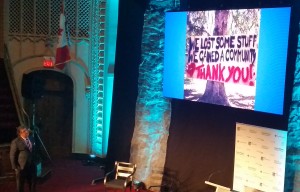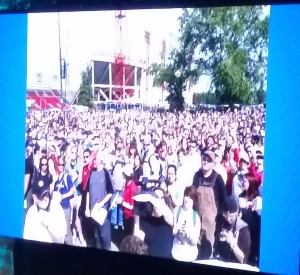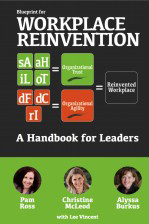Imagine an organization where the leaders were 100% transparent about what the organization was doing throughout a crisis. Imagine an organization where the leader placed compete trust in customers to do the right thing within their business. How about an organization where people feel so connected to the overriding purpose that they volunteer to help each other?
Sound like a fantasy?
What if I told you this is happening – now – in a GOVERNMENT organization?!?
I know – I must be dreaming, right? Perhaps my belief in the Blueprint for Workplace Reinvention has altered my reality…?
 In fact, after hearing Naheed Nenshi speak about how he is transforming government in Calgary, I realized that he was demonstrating every Principle of the Blueprint’s Organizational Trust model. And I also realized that if he could do that, in a government system which is so often plastered with red tape, then leaders in private companies surely could do the same!
In fact, after hearing Naheed Nenshi speak about how he is transforming government in Calgary, I realized that he was demonstrating every Principle of the Blueprint’s Organizational Trust model. And I also realized that if he could do that, in a government system which is so often plastered with red tape, then leaders in private companies surely could do the same!
Here are some stories of how Naheed Nenshi is reinventing government – I hope they help us all to reinvent work!
Some Background – the 2013 Alberta Flood

In June of 2013, Alberta was hit with what the provincial government called the worst flood in Alberta’s history. 100,000 Calgary residents were evacuated and a state of emergency was declared.
Naheed Nenshi had been Mayor for about 3 years. He was in Toronto for an event and a wedding, and flew home to Calgary as soon as they learned about the flood.
The stories Nenshi shared about how he and his team managed this crisis and how they manage the city in general are stories I think all leaders can learn from.
Strategic Alignment – Think like a citizen.
Within the City, Nenshi encourages all colleagues to ask themselves “how is what I’m doing right now making it better for people to live here?” This question helps them eliminate non-necessary work and focus on the important things – what Nenshi refers to as this “grand experiment” they’re all involved in – building a community in Calgary. It was through alignment like this that the City was able to allow citizens to book swimming classes while at the rec centre for their current swimming class. By thinking like a citizen, city workers realized that life guards needed training in booking and cash management so that they could serve citizen’s needs.
Does everyone in your organization consider how what they are doing will affect the end customer? Try asking a question like this to yourself and to people around you. What do you find? Imagine if everyone was focused on making things better for your customer every day, with everything they did… how much further would your organization rise and beat your competition?
Authentic Humanity – Three things for Calgary.
 Nenshi believes that in this country, we have a promise that every single person, every day has the ability and opportunity to a great Canadian life. He believes that the power to make that promise work for every one of us is within every one of us. This greater purpose bonds all Calgarians. Nenshi uses what I call the Rule of Three here. He challenged every citizen of Calgary to do 3 things to make the community better. These things can be simple – like shoveling a neighbour’s driveway – or much larger – like running for council. Regardless, if every Calgarian (that’s 1.2 million people) did three things each year to benefit the community, imagine the impact.
Nenshi believes that in this country, we have a promise that every single person, every day has the ability and opportunity to a great Canadian life. He believes that the power to make that promise work for every one of us is within every one of us. This greater purpose bonds all Calgarians. Nenshi uses what I call the Rule of Three here. He challenged every citizen of Calgary to do 3 things to make the community better. These things can be simple – like shoveling a neighbour’s driveway – or much larger – like running for council. Regardless, if every Calgarian (that’s 1.2 million people) did three things each year to benefit the community, imagine the impact.
Take a look at your organization. Imagine if everyone did 3 things each year to benefit the mission of the company – from helping individuals in the organization, to bringing forward a great initiative
Operational Transparency – Tell Citizens everything.
At the beginning of this crisis, Mayor Nenshi made the decision that they were going to tell citizens everything. He told his team “If we are going to hold anything back, I need to be a part of that decision.” They ended up not every needing to hold any information back.
Imagine if your senior leadership team shared the information behind their decisions? Imagine if departments shared the projects they were working on and information they had access to, frictionlessly? Wouldn’t everyone be able to make better decisions?
Individual Leadership – “Just go help.”
 After a few days of the state of emergency, people were asking how they could volunteer to help. On Sunday night, after not sleeping in days, Nenshi left a team of people in charge of organizing the volunteers. When he woke up on Monday, he heard an announcement on the radio telling people to show up at 9 am to volunteer. Knowing this was only 2 hours notice, Nenshi said to his team “no one will show up!” They explained that they hadn’t developed a plan, so they did that deliberately so that there would be a small group and they could buy some time to plan for a larger group on Tuesday.
After a few days of the state of emergency, people were asking how they could volunteer to help. On Sunday night, after not sleeping in days, Nenshi left a team of people in charge of organizing the volunteers. When he woke up on Monday, he heard an announcement on the radio telling people to show up at 9 am to volunteer. Knowing this was only 2 hours notice, Nenshi said to his team “no one will show up!” They explained that they hadn’t developed a plan, so they did that deliberately so that there would be a small group and they could buy some time to plan for a larger group on Tuesday.
Much to their surprise, thousands of people showed up. They didn’t even have a microphone to address the crowd with. Nenshi used the Fire Chief’s car radio to talk to the crowd and explains that he just said:
Just go help. Go to the impacted neighbourhoods and go door to door. You’ll know what to do.
That’s just what they did. Thousands of volunteers helped thousands of residents they didn’t know, cleaning out their homes, salvaging what they could, helping to save memories. Others supported their fellow volunteers with food, water, and transport of supplies. As Nenshi described, they were
everyday people doing everyday things with their hands to make extraordinary change
Imagine giving people the vision or direction and letting them get to work to figure out how to get there. In today’s world, where most people can get their work done wherever and whenever they need to (if given the opportunity), they want more autonomy. When given autonomy, they feel more engaged and committed to their work.
Trust – People are not stupid.
After the water receded, people wanted to see their homes and plan fro their future. Their lives were in those homes – imagine not knowing what was left… More than 35,000 homes were affected. Nenshi relied on what he calls his core political philosophy:
People are not stupid. Human beings are endlessly smart, good and resilient, and they will do the right thing if you give them the information they need.
So that’s what the city did. Rather than operate as most governments or organizations would, covering their butts and opting to protect through controlling others, they told people they could go home as long as they promised to be safe. And they gave them guidelines for safety, including what to bring and what to watch out for.
Imagine your company trusting your customers or employees in such a way – imagine rather than providing policies, they said “do the right thing” and let you get to it. How much more engaged and productive might people be?
How are you reinventing your organization?
 We all have power to build these principles within our workplace – whether it’s through improved communication and collaboration, simply trusting our colleagues more, or sharing information more frictionlessly. For more than 100 tips and examples, check out the Handbook. Just get started.
We all have power to build these principles within our workplace – whether it’s through improved communication and collaboration, simply trusting our colleagues more, or sharing information more frictionlessly. For more than 100 tips and examples, check out the Handbook. Just get started.
Do ONE THING this week.
By the way, you should also follow Naheed Nenshi on Twitter – he is my favourite Digitally Fluent leader!
